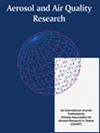软x射线辐射分解反应器中新粒子形成的表征:amc -次生无机气溶胶
IF 2.5
4区 环境科学与生态学
Q3 ENVIRONMENTAL SCIENCES
引用次数: 1
摘要
本文章由计算机程序翻译,如有差异,请以英文原文为准。
Characterization of New Particle Formation in Soft X-ray Radiolysis Reactor: AMCs-to-Secondary Inorganic Aerosols
Airborne molecular contaminants (AMCs) in cleanrooms should be monitored and controlled tightly to reduce yield loss since they can be converted into nanoparticles or surface haze contamination on semiconductor chips or masks. Soft X-ray radiolysis was developed to detect AMCs as low as the ppt-level by forming secondary aerosols from AMCs under soft X-ray irradiation. However, new particle formation (NPF) using soft X-ray radiolysis has not been well investigated. In this study, we have developed a continuous flow tube reactor to understand NPF from AMCs using soft X-ray radiolysis. The reactor was designed to continuously maintain parabolic laminar flows within the tube reactor and to extend the exposure time of the gas molecules to soft X-rays by increasing the number of reactor modules. With the increase in the concentration of sulfur dioxide (SO 2 ), the size distribution of particles formed by soft X-ray radiolysis also showed enhanced NPF and subsequent particle growth. However, the conversion rates of SO 2 into particles decreased simultaneously. The NPF and subsequent particle growth in the reactor were also positively affected by the exposure time to soft X-rays and the residence time. The exposure time was controlled by the number of soft X-ray emitters, and the residence time in the reactor was adjusted by the number of reactor modules and the inlet flow rate. The mixture of ammonia (NH 3 ) with SO 2 stabilized the nucleation of particles formed from SO 2 but suppressed the particle growth. In contrast, nitrogen dioxide (NO 2 ) suppressed both nucleation and growth of particles formed from SO 2 . Among the parameters for controlling soft X-ray radiolysis, the soft X-ray intensity had the highest effect on the inorganic AMCs-to-nanoparticle conversion
求助全文
通过发布文献求助,成功后即可免费获取论文全文。
去求助
来源期刊

Aerosol and Air Quality Research
ENVIRONMENTAL SCIENCES-
CiteScore
8.30
自引率
10.00%
发文量
163
审稿时长
3 months
期刊介绍:
The international journal of Aerosol and Air Quality Research (AAQR) covers all aspects of aerosol science and technology, atmospheric science and air quality related issues. It encompasses a multi-disciplinary field, including:
- Aerosol, air quality, atmospheric chemistry and global change;
- Air toxics (hazardous air pollutants (HAPs), persistent organic pollutants (POPs)) - Sources, control, transport and fate, human exposure;
- Nanoparticle and nanotechnology;
- Sources, combustion, thermal decomposition, emission, properties, behavior, formation, transport, deposition, measurement and analysis;
- Effects on the environments;
- Air quality and human health;
- Bioaerosols;
- Indoor air quality;
- Energy and air pollution;
- Pollution control technologies;
- Invention and improvement of sampling instruments and technologies;
- Optical/radiative properties and remote sensing;
- Carbon dioxide emission, capture, storage and utilization; novel methods for the reduction of carbon dioxide emission;
- Other topics related to aerosol and air quality.
 求助内容:
求助内容: 应助结果提醒方式:
应助结果提醒方式:


